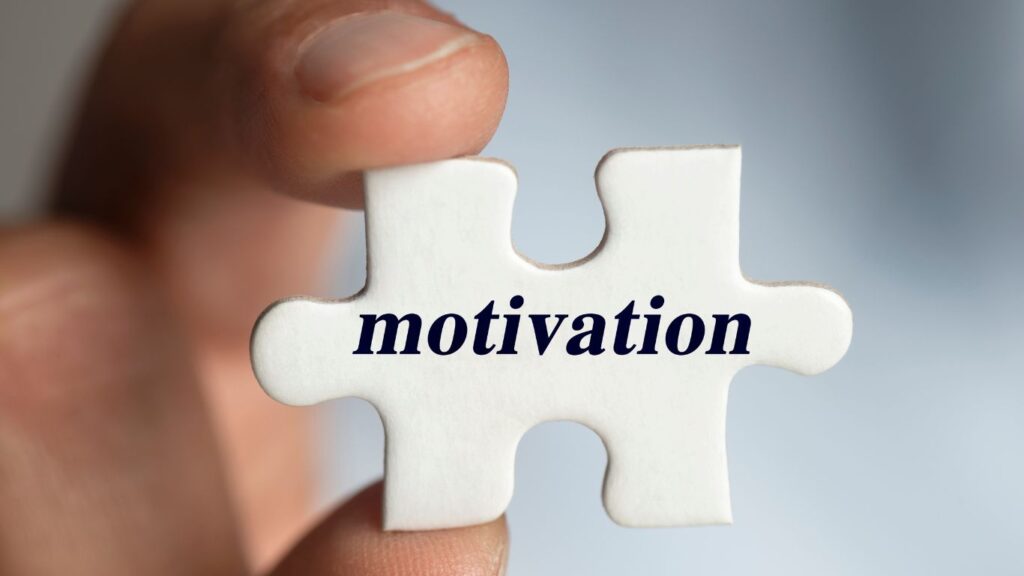What is Motivation?
Motivation is the internal or external drive that prompts individuals to act, pursue goals, or engage in specific behaviors.
- Inner Drive: Some motivations come from within, like pursuing a passion or personal growth.
- External Rewards: Sometimes, we’re motivated by tangible rewards, like bonuses, or intangible ones, like praise or recognition.
- Goal Chasing: It’s the fuel that pushes us towards our dreams, big or small.
- Mood Swings: Just like our moods, our motivation can go up and down based on our surroundings, experiences, or feelings.
- Needs & Desires: Think of Maslow’s pyramid: from basic needs like food to bigger desires like achievement.
- What Shapes Our Drive?: Our interests, values, and even the people around us can boost or dampen our motivation.
- Learning & Growth: Ever felt eager to learn something new? That’s motivation at play, pushing us to grow.
- Feel-Good Factor: When we’re motivated, we feel better, achieve more, and enjoy a richer life experience.
What are different components to motivation?
- Intrinsic Motivation:
- Driven by personal satisfaction or passion.
- Motivated by internal rewards like joy, fulfillment, or personal growth.
- Extrinsic Motivation:
- Motivated by external factors or rewards.
- Includes tangible rewards like money or intangible ones like praise.
- Drive Theory:
- Based on basic biological needs.
- Motivation arises from the desire to fulfill these needs, such as hunger or thirst.
- Achievement Motivation:
- Desire to excel or achieve a specific goal.
- Driven by the need for accomplishment and success.
- Affiliation Motivation:
- Desire to belong or be affiliated with a particular group.
- Driven by the need for social interaction and relationships.
- Power Motivation:
- Desire to influence or control others.
- Driven by the need for authority or dominance.
- Cognitive Theories:
- Based on individual perceptions, beliefs, and expectations.
- Includes expectancy-value theory and self-determination theory.
- Emotional Component:
- Feelings and emotions play a role in motivation.
- Positive emotions can boost motivation, while negative ones can hinder it.
- Physiological Component:
- Biological factors, such as hormones or neurotransmitters, influencing motivation.
- Includes the role of dopamine in reward-seeking behavior.
- Social and Environmental Factors:
- External factors, such as cultural norms or peer influence, shaping motivation.
- The role of societal expectations and environmental cues in driving behavior.
Why do we sometimes lack motivation, and what lies beneath this feeling?
- Lack of Desire:
- Sometimes, we simply don’t want to do something.
- The task or goal might not align with our personal interests or values.
- It may not offer any intrinsic or extrinsic rewards that appeal to us.
- Perceived Inability:
- The belief that we don’t have the skills, knowledge, or resources to accomplish the task.
- Past failures or setbacks might have eroded our confidence.
- A fear of failure or judgment can make us doubt our capabilities.
- Overwhelm:
- The task might seem too big or complex.
- Not knowing where to start or feeling there’s too much to handle can paralyze action.
- External Pressures:
- Societal or peer expectations might make us feel forced into a task, reducing intrinsic motivation.
- Doing something solely for external validation can diminish our internal drive.
- Mismatched Goals:
- If a task doesn’t align with our long-term goals or aspirations, motivation can wane.
- It’s essential to see the bigger picture and how a task fits into our broader life journey.
- Mental and Emotional Barriers:
- Mental health challenges, like depression or anxiety, can significantly impact motivation.
- Emotional states, such as sadness or frustration, can also hinder our drive.
- Environment and Surroundings:
- A non-conducive environment, filled with distractions or negative influences, can sap motivation.
- Surrounding oneself with positive, motivating individuals can boost drive and determination.




